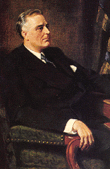Roosevelt, Franklin D.

When Franklin D. Roosevelt (FDR) became U.S. President in 1933, he sought the advice of modern-thinking experts in many fields in an effort to better the nation. Looking into colleges and universities, FDR inserted intellectuals immediately into the emergency of the Great Depression; both he and the American people expected results. With a long-term interest in the science of forestry and resource management, FDR was particularly struck by the waste of American natural resources at a time of great need. In his inaugural address, FDR stated: "Nature still offers her bounty and human efforts have multiplied it. Plenty is at our doorstep, but a generous use of it languishes in the very sight of the supply." His initiatives sought to intelligently utilize these resources while creating jobs for out-of-work Americans.
These policies incorporated the emerging field of ecology with federal policies to manage watersheds, maintain forests, teach agriculture, and hold fast the flying soils of the southern plains. The main impetus for federal action was derived from a national surge in unemployment. The economic collapse of 1929 left millions of Americans incapable of making a living—nowhere was this more evident than on the American southern plains.
Terrible drought combined with economic difficulty made many farms in the rural midwestern United States incapable of sufficient production. Residents of Oklahoma (nicknamed Okies) fled westward to California, creating resettlement problems on top of already difficult circumstances. In the southern plains, the loose topsoil was lifted by heavy winds creating dust storms of epic proportions. Press coverage of the Dust Bowl of the 1930s presented a natural disaster caused by drought and misfortune. However, government-made documentary films such as The Plow That Broke the Plains, and programs of FDR's New Deal, infused a bit of ecological background to explain desertification and the agricultural practices that can be used to combat it. Living through this natural disaster, the American public learned a great deal about its role within the natural environment. Moreover, it was recognized that proper land use could be taught, and the federal government installed extension agents to do so.
This was also apparent in New Deal river projects, particularly the Tennessee Valley Authority. Finally, Franklin Roosevelt’s pet project, the Civilian Conservation Corps (CCC), merged with former President Theodore Roosevelt’s trust in the importance of work in the outdoors for the development of young Americans with scientific understandings of agriculture and watershed management. CCC projects often grew from lessons of ecology—for instance, the need to construct “shelter belts” of trees to help block the wind on the plains and to keep topsoil in place—but their most important priority was creating employment opportunities for young men.
Overall, the emergence of the field of ecology brought a new utility for science in the everyday life of Americans. Scientific knowledge, however, was still largely controlled by experts—often working for the federal government.
Further Reading
New Deal Network Homepage